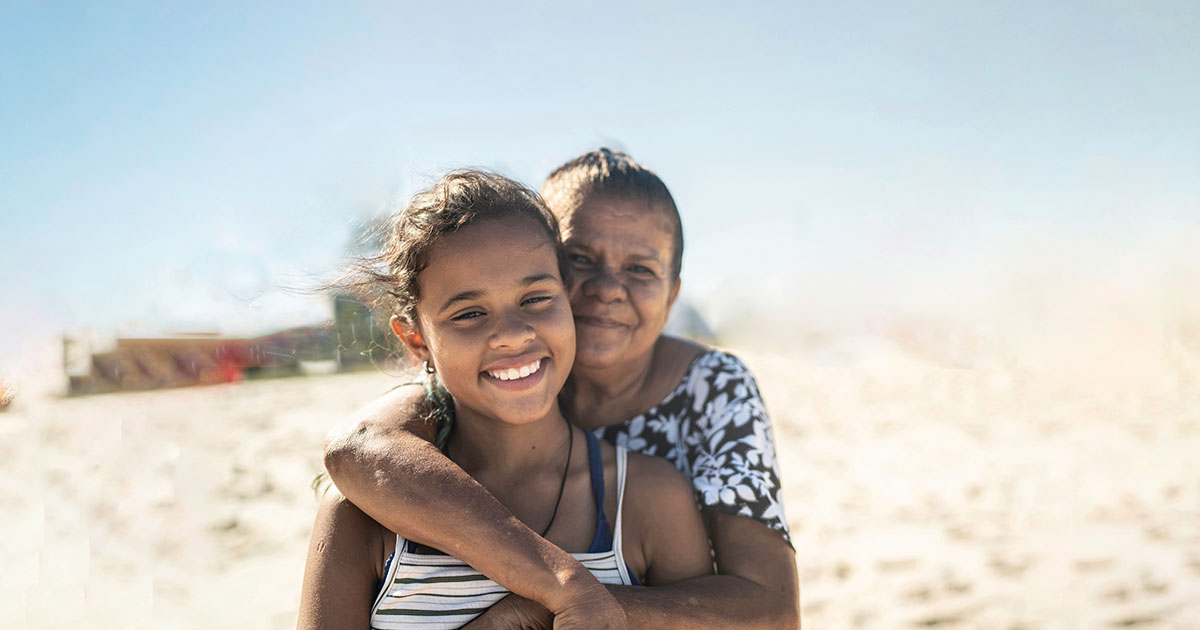Reconciliation needs brave and impactful action
- Details
As I write this, I am on the land of the Gadigal people of the Eora Nation who I acknowledge and thank as the traditional custodians of this land. In doing so I recognise that I wasn’t invited to live here and that the place I moved to from the UK eleven years ago was nurtured and protected for more than 60,000 years before the arrival of Europeans and colonisation by the British. I moved with my family to Australia in 2009. Before coming to Australia I had what I now know was a superficial understanding of the depth and complexity of Aboriginal and Torres Strait Islander cultures and the role of the British. Over time my knowledge has grown and I have been taught much by Mission Australia staff past and present who have, in some cases very patiently, helped me to learn more about the pressing need for Reconciliation in Australia.
This year’s National Reconciliation Week (27 May to 3 June) theme “More Than a Word. Reconciliation takes Action” is pertinent as it urges us all to move beyond awareness and words, and use these as a springboard to take bold actions individually and collectively toward a just, equitable, reconciled Australia.
Those who are part of the Reconciliation movement have persevered for months, years, decades and even centuries building crucial awareness and knowledge about the unfinished business of Reconciliation.
In the past year in particular, with the movements like Black Lives Matter and Change the Date gaining momentum, we have seen people rise up, declaring their commitment to truth-telling and acting and speaking bravely together about issues that affect Aboriginal and Torres Strait Islander people.
As part of my personal Reconciliation journey, I expect of myself truth-telling, calling out issues of inequality, systemic racism and instances where the rights of Aboriginal and Torres Strait Islander peoples are ignored, denied and reduced. I seek to ask questions, listen and learn from the people and communities with whom I am fortunate enough to spend time.
I am appalled by the deaths of Aboriginal people in custody in Australia. I am offended by people who seek to deny the Stolen Generations and I shake my head in disbelief when Aboriginal cultural sites or artefacts are destroyed or stolen, and their destruction or removal is explained away or excused.
However, without actions, the emotions I experience will make little difference. But alongside those emotions, I have abundant privileges, one of which is to be CEO of an organisation that can make a difference.
As an organisation, we continue to be fully committed to Reconciliation as a fundamental part of our work. Reconciliation is not just for one week of every year. It’s about a better future for Australia, as a country, every day.
For the first time in Mission Australia’s 160 year history, Reconciliation is enshrined in our Strategy as an operating principle, and from this, flows further action. This year, we reinforced our commitment to our Reconciliation Action Plan (RAP), with our RAP Reference Group working hard on a new RAP this year. We have established a new RAP Champions network with a focus on how best to support teams to build deep, meaningful relationships across states and territories. More than 70 staff raised their hands to join the network, which will play a vital role in progressing our RAP in the coming years.
In April 2021, we made a submission to the Federal Government’s co-design process to develop a model for an Indigenous Voice to Parliament. Alongside many other organisations, individuals and community groups around Australia, our submission focused on the need for a national referendum on the Indigenous Voice to Parliament once the model has been decided, and for it to be enshrined in legislation after the referendum has been held. These measures are vital to ensuring that an Indigenous Voice to Parliament is a permanent feature of our political processes.
Last year, for the first time in our Youth Survey’s 19-year history, equity and discrimination was the top national issue for young Australians. They also told us they are both personally experiencing and witnessing racial injustices across the nation.
In our most recent National Aboriginal and Torres Strait Islander Youth Report, young Aboriginal and Torres Strait Islander people said they’re facing challenges such as unacceptably high levels of bullying which we know is connected with racial discrimination, poor mental wellbeing, homelessness and insecure housing.
In the realm of homelessness and housing, we know from the data and through our work at Mission Australia that overcrowding and homelessness continues to be a major issue disproportionately affecting Aboriginal and Torres Strait Islander communities. COVID-19 also brought to the fore many of the inequities too often overlooked in terms of health and housing for Aboriginal and Torres Strait Islander people.
We must take this awareness and understanding and use it as foundation for more substantive, courageous action.
Everyone must play their role to enact solutions and efforts to end discrimination and racism against Aboriginal and Torres Strait Islander people. This is why Mission Australia continues to advocate and stand alongside Aboriginal and Torres Strait Islander people so that they are central to the co-design and co-implementation of the services tailored to their needs. Governments at all levels must commit to creating the conditions for an increased supply of housing and homelessness services designed to benefit Aboriginal and Torres Strait Islander people, which should be co-designed and implemented with community members, Elders and Aboriginal Community Controlled Organisations to ensure they are culturally adapted and appropriate. More broadly, we continue to amplify our voice, calling for Aboriginal and Torres Strait Islander people to have far greater say in the policies and services that affect and serve them and their communities.
Of course, not all of us have the resources behind us to initiate actions such as working alongside Aboriginal Community Controlled Organisations in local communities, enacting RAPs, creating and analysing evidence to advocate for and alongside Aboriginal and Torres Strait Islander people, or writing submissions to Government. But we are all able to take bold actions to ensure that we will not do things that oppose, resist or impede our journey to Reconciliation.
Together, we can raise our voices, speak truths, advocate, ask uncomfortable questions, critically analyse the facts and history, and ensure we are properly informed about issues that affect Aboriginal and Torres Strait Islander people.
But our work is never done. We cannot play it safe or be complacent with words alone. There remains far more need for concerted and courageous actions that are informed by the perspectives and experiences of Aboriginal and Torres Strait Islander people. The onus is on each and every one of us to reflect on our own contributions, then strive every day to take braver, more impactful actions toward Reconciliation.

James Toomey
CEO Mission Australia
@jbc_toomey
Australia celebrates National Reconciliation Week from 27 May to 3 June every year. These dates commemorate two significant milestones in the Reconciliation journey – the 1967 Referendum acknowledging Aboriginal and Torres Strait Islander peoples, and the High Court Mabo decision, respectively. NRW is preceded by National Sorry Day on 26 May. Visit the website for more information.
Related media releases
Read about what we’ve been working on, our stance on important social issues and how you make a difference to vulnerable Australians' lives.



